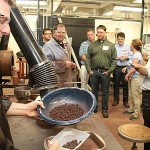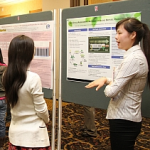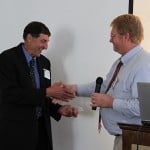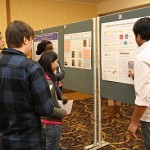
ASISC members pool resources to address a diverse spectrum of interdisciplinary research questions. During the meeting they share their work and experiences to further the development of a new generation of sustainable, economical mineral processing technologies.
MORE
 The 2nd Annual Research Forum for Graduate and Undergraduate Students for the Department of Chemical Engineering was held on Wednesday, January 22, 2014.
The 2nd Annual Research Forum for Graduate and Undergraduate Students for the Department of Chemical Engineering was held on Wednesday, January 22, 2014.
View a selection of videos from the 2014 Chemical Engineering Research Forum
See photos from the 2014 Annual Research Forum for Graduate and Undergraduate Students for the Department of Chemical Engineering
Michigan Technological University is one of three colleges and universities that will collaborate with the biotech-based alternative fuels and chemical company LanzaTech on a $4 million research project. They will work to find ways to convert waste methane into low carbon fuels and chemicals.
Funding for the 3-year research project comes from the US Department of Energy’s Advanced Research Projects Agency-Energy (ARPA-E).
Chemical Engineering Professor David Shonnard will lead the research at Michigan Tech, with Robert Handler providing technical and program management support. Shonnard is director of the University’s Sustainable Futures Institute (SFI) and holds the Richard and Bonnie Robbins Chair in Sustainable Materials. Handler is SFI operations manager
 ASISC is a true partnership of academic institutions and industry with research interests in sustainable iron and steel making. This partnership leverages the strengths of academia and industry by pooling resources to address a diverse spectrum of interdisciplinary research questions of mutual benefit to ASISC members.
ASISC is a true partnership of academic institutions and industry with research interests in sustainable iron and steel making. This partnership leverages the strengths of academia and industry by pooling resources to address a diverse spectrum of interdisciplinary research questions of mutual benefit to ASISC members.
Another I-Corps Team Claims First: Michigan Tech’s latest I-Corps team placed first among 21 teams in New York last week, after a final presentation of their market analyses for new technologies. The team was led by Chemical Engineering Associate Professor Adrienne Minerick, with post-doc Kaela Leonard serving as entrepreneurial lead and team mentor Mary Raber, associate director of the Institute for Leadership and Innovation.
A National Science Foundation program, I-Corps stands for Innovation Corps. Its goal is to help researchers learn how to do customer and market analysis, to enable them to fine-tune their technologies to meet an actual market need.
The technology they are looking to develop is a rapid, portable blood-typing device.
Minerick’s team is the third one from Michigan Tech chosen to participate in the I-Corps program.
ESC/BRC Student Research Forum Winners Announced
The Ecosystem Science Center and the Biotechnology Research Center announced award recipients of the Ninth Annual ESC/BRC Student Research Forum, held March 27.
For the graduate students, two Grand Prize Awards and six Merit Awards were presented. They were selected from among the 59 posters and abstracts submitted by graduate students conducting research related to ecology, the environment and biotechnology at Michigan Tech.
Maria Tafur of the Chemical Engineering depaertment won a Merit Award for, “Reduction of Porcine Parvovirus Infectivity in the Presence of Protecting Osmolytes, ” Advisor: Caryn Heldt
Four Michigan Tech Chemical Engineering students placed in the annual Minerals Processing division undergraduate and graduate poster competition during the Society of Mining, Metallurgy and Exploration (SME) Annual meeting in Denver on February 27. This annual poster competition showcases research from the top mining and mineral processing programs across the nation and is judged by some of the top engineers and scientists in industry and academia. It involved a five-minute oral presentation in a special session as well as a public poster display at a large SME gathering.
PI David Shonnard (ChE) has been awarded a three-year research co-op/joint agreement totaling $300,000 for “Accelerated Development of Commercial Hydrotreated Renewable Jet (HRJ) Fuel from Redesigned Oilseed Feedstock Supply Chains,” from the US Department of Agriculture.
 The 1st Annual Graduate Research Forum for the Department of Chemical Engineering was held on January 24, 2013.
The 1st Annual Graduate Research Forum for the Department of Chemical Engineering was held on January 24, 2013.
Judges for the Oral Presentations were:
Awards will be announced on Friday, February 1, 2013, 12-1 in room 215 Chem Sci.
Check the webpage for photos and award announcements.
Kathleen Halvorsen (SS), David Shonnard (ChE), and Rodney Chimner (SFRES) have received $777,206 from the National Science Foundation as the first year of a five-year grant totaling $4,841,735 for the project, “OISE-PIRE Sustainability, Ecosystem Services, and Bioenergy Development Across the Americas.”
